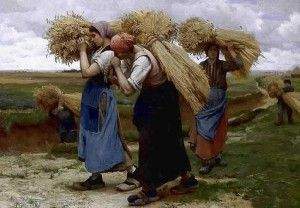THE MONEY BAG

- 3459
- 18
- Miss Drew Stroman

Four peasants returned from the city lamenting the little they had.
- One of them said: If I found a bag of money, I would take only the third, the rest, together with the bag, would give it to you.
- Another peasant commented: I would divide it among all of us.
- The third said: I would be satisfied with only fifth of the money.
- And the last one said: I would suffice the sixth part.
Suddenly, as if by magic, they find a bag full of money along the way and decide to distribute the money as stipulated. The first peasant would take the third, the second corresponds to a quarter to the third one a fifth and the last part of the sixth part.
There were 8 tickets in the bag: one of three rubles and the others of a ruble, five rubles and ten rubles. None of the peasants could take exactly the part that corresponded without changing the tickets so they decided to wait to see if they could change with a traveler.
Soon, a rider approaches and the peasants stop him to explain the problem and ask for change.
The rider told them: a ruble I can not change you, but give me the bag with the money, I will put in it my ruble, of all the money I will give each one their part and I will keep the bag.
The peasants agreed that the rider joined all the money, delivered the first 1/3 peasant of the total, to the second 1/4, to the third 1/5 and to the fourth 1/6 of all the money and stayed with the bag.
The rider thanked them and left. The peasants then were thoughtful since despite having contributed a ruble to the bag and distribute all the money as they had agreed the rider.
They saw that they had the same number of tickets that had initially in the bag, however, nobody had the 3 ruble ticket.
- I received more than I was up to me, said the first peasant.
- I also said the second, I received 25 more kopeks.
Everyone received more money than they were responsible for and yet the rider took the three ruble ticket.
How much money did the peasants find? and What tickets gave each of the peasants?
(Kopek is a monetary unit that is equivalent to the hundredth of the ruble.)
SolutionThe peasants did not know how to add broken correctly. If we add all the parts to which the peasants wanted to divide the money:
have:  which is less than the total bag. It turns out that they all wanted to receive less money than they had found. The money found, along with the ruble that added the rider, was divided into 60 parts. Of them 57/60 parts were left the peasants and the rider stayed with 3/60 parts.
which is less than the total bag. It turns out that they all wanted to receive less money than they had found. The money found, along with the ruble that added the rider, was divided into 60 parts. Of them 57/60 parts were left the peasants and the rider stayed with 3/60 parts.
We know that the rider stayed with 3 rubles. Therefore, 3/60 = 1/20 of the total are 3 rubles then the total amount of money was 3 x 20 = 60 rubles.
The first peasant received 1/4 part, that is, 15 rubles, but if the rider did not put his ruble, he should receive 25 kopeks less is to say 14 rubles and 75 kopeks, which corresponds to 1/4 part of the money found. From the foregoing it is confirmed that 14 rubles 75 kopeks x 4 = 59 rubles were found and with the rider's money 60 rubles were.
The rider, put in the bag 1 ruble and took 3. He won 2 rubles making an intelligent cast.
In the bag there were then five 10 ruble tickets, a 5 bill, one of 3 and one of 1 ruble. The rider gave the first peasant 20 rubles in two 10 tickets; 15 rubles to the second in a 10 and one ticket of 5; 12 rubles to the third in a 10 -and two blush ticket and the last farmer gave a 10 ruble ticket. He stayed with the three ruble ticket.

